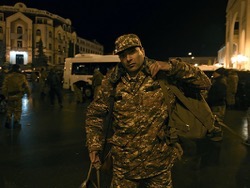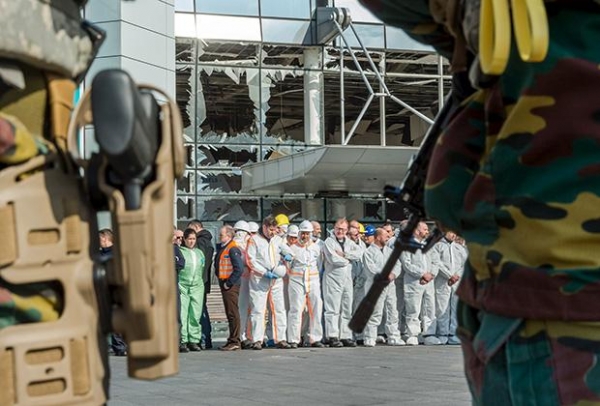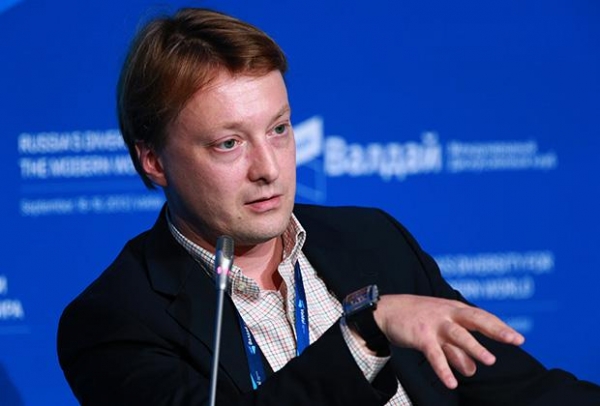
Timofei Bordachev of the internal problems of the European Union and its relations with Russia
In the European Union understand that in the fight against terrorism the EU and Russia are on the same side. However, the independent Moscow’s policy seems European elites more serious challenge than the actions of the jihadists. And although the EU has friends, expect the lifting of sanctions in the foreseeable future is not worth it. About it in interview to “Lente.Roo” said the Director of the Center for comprehensive European and international studies, faculty of World economy and world politics HSE, Director of the Eurasian program of the international discussion club “Valdai” Timofei Bordachev.
“Ribbon.ru”: After the attacks in Brussels enough time has passed to ensure that, having calmed down, discuss the reasons and details of this crime. You lived in Belgium and regularly visit in Brussels. Was it a surprise to you that the target of the terrorists was this city?
Bordachev: Yes And no. On the one hand, it was a surprise, because the terrorists struck at the defenseless country of Europe, the country which never participated in adventures in the middle East and North Africa. Belgium never bombed Arab villages, was not aggressive towards the Islamic world. In 2003, Belgium, as a NATO country, refused to support the invasion of Iraq. So the recent terrorist attack in Brussels looks doubly cynical. On the other hand, this attack had all the technological prerequisites, so it was to be expected. Belgium is absolutely not ready to struggle with terror. This country denies the very notion of a police state and is considered one of the most liberal in the EU. There is a weak Federal law enforcement system. Belgium open, defenseless, and for these reasons it is easy to organize terrorist attacks.
Thus Belgium is the champion by quantity of the jihadists. The ratio of total population of the country and gone to Syria and Iraq radicals, it bypasses even France with it the largest in Europe the Muslim community. Sad fame of the Brussels district of Molenbeek, where there were many performers of the terrorist attacks carried out recently in the EU. It is not logical to assume that sooner or later the holders of a Belgian passport, having gained combat experience in the middle East will be back open front Jihad in the homeland?
I honestly didn’t expect that the terrorists will “create havoc in his house”. Belgium was always open to refugees, and economic migrants. Therefore, it has developed a large Muslim community whose members are socially protected. The Islamists simply showed ingratitude towards this country.
At the time, between British authorities and the Islamists had an unwritten contract: you don’t blow up, we won’t do. Despite this, in 2005 the radicals staged in a London subway attack that killed 52 people. Whether, in principle, to count on gratitude from radicals?
I think Europe is aware of is the tolerance towards Muslims does not protect against acts of terrorism. Many right-wing politicians speculate on this subject, but we must understand that the countries which, like Belgium, have reached the highest point of development of democracy, are not willing to limit individual rights and freedoms for the sake of security. What you can easily do in the U.S. or Russia, Belgium and the Netherlands will succeed with great difficulty and will require the citizens of peremanivanie themselves and their ideas about freedom and rights. After all, Belgium is a country where there was a modern European democracy, where there was a modern European government, this country, always one step ahead of everyone in matters of human rights.

Brussels airport after the attack
Photo: Reuters
The attacks in Brussels and Paris — this is the trump card for far-right politicians. How much dividend will bring them a reminder of the terrorist attacks and the “Muslim threat”?
If we are talking about Belgium, the local extreme right-wing parties, primarily Flemish, is widely represented in Parliament. Their motto was the struggle for the autonomy of the Dutch-speaking areas and reducing financial relations with French-speaking areas. In other words, to the success of the Flemish far-right did not come under the slogans of fight against migrants. Therefore, it is unlikely that the increased anti-migrant rhetoric will bring them a lot of extra points. Moreover, their positions, and so strong in Belgium.
Why did anti-migrant, xenophobic and euroskeptic go hand in hand?
The EU is perceived as a structure, leveling of national identity. And to isolate themselves from outsiders, migrants easiest rallying on a national basis. If the EU denies the nationalism he calls the exclusion of those who are against migrants. What occurs here is the bow of xenophobes and eurosceptics.
Today, far right parties marginalized, despite all the attempts of their leaders to improve the image. Can appear in the near future, a respectable far-right party, appealing to anti-immigration rhetoric?
Now in Western Europe, many parties, more recently, former absolute outcasts, trying to become part of the political elite. This happens in the Netherlands, these moves by the front national in France. It turns out they are not very good. But there is another trend: the centrist and the conservative party are beginning to adopt elements of the nationalist agenda. Not new right party will enter the elite, and the existing elite will popravit.
After the attacks in Paris and Brussels, member countries of the European Union will rally in the face of a common threat (in particular, more closely interact with their intelligence) or, on the contrary, I will try harder to isolate themselves from each other to prevent movement of radicals?
The issue today is one of the most important and the most difficult for the European Union. Many in Europe believe that you need to take the next step towards integration and move to a common migration policy, common rules for granting asylum and police action against terrorists. But it is very difficult. In the first place because the fight against terrorism, like any security, is located in the heart of national sovereignty. In-depth cooperation in this field would mean limiting its own sovereignty. For any state it is very difficult, because the security of citizens is its primary responsibility. To entrust this matter to its EU partners, Europe is unlikely. Now the police, for example, in France you can’t detain criminals in Germany, and in Belgium it is impossible to arrest the police from French-speaking areas in Dutch-speaking criminals. Donate to this part of the sovereignty of European countries is unlikely.
So strengthening the fight against terrorism, and movement toward a police state will go to national and not pan-European level. As a result, the integration will not be strengthened, and be eroded. Some EU countries — Sweden, Austria — introduced today the, which must be held and the citizens of the EU States. The fact that people have to stand in line at passport control, he reduces the interest to work in other EU countries. Imagine: you are flying from Brussels to Frankfurt in 30 minutes, and then as many more are standing in line at passport control — not easier to find work in the homeland? So the fight against terror and will undermine European integration, destroying its main achievement — an internal openness.

Timofey Bordachev
Photo: Anton Denisov / RIA Novosti
In light of this, how do you assess the prospects of the European Union? Don’t stop if he is to exist in its current form?
Russia needs a strong United Europe. Therefore, we are interested in the EU these difficulties overcome. I personally what is happening in the EU causes sadness. Many of my friends and colleagues from the EU believe that he needs to reach a critical point and then the necessary decisions will be taken, as was the case with the Eurozone crisis. However, each new crisis the EU is becoming more serious. Such systemic crises in the last three. The first is the failure of the European Constitution in 2005, followed by exhausting discussions and consultations on a new Treaty. The participants put on the first place not pan-European and national interests. The second is a crisis of the Euro zone. To leave it was possible only due to the reduction measures of the competencies of the common institutions in Brussels. The third systemic crisis originated in the sphere of solidarity in the freedom of movement and security. As I said, each crisis becomes more serious. Will the EU get out of the current, remaining as a single entity, is unknown.
Since you yourself said that Russia needs a strong Europe, let’s talk about Russian-European relations. You know the Europeans that in fighting terrorism we’re on the same side?
Such an understanding is definitely there. The absolute most sensible European politicians know that Russia before the EU, even in the 1990s, faced with terrorism. And in this sense we, of course, on one side of the front line. But for most of the European elite of Russian foreign policy is a much bigger problem than any jihadists.
Sounds just horrible…
As cynical and horribly as it sounds, but radical Islamism is a threat to the external, it belongs to another civilization, and Russia is part of European civilization, but at the same time, it allows me to disagree with the policy of the EU and the US. Simply put, Islamist terrorism is an outside call, while Russia is “a mutiny”. Therefore, an independent Russian foreign policy in Europe is considered a more serious problem than terrorism.
The European elite are using Russia as a bogeyman, to consolidate citizens in the face of external threats. In other words, scaring the citizens of the Russian bear, the EU policy of trying to solve the problems inside the European Union. How you think, how effective is this strategy?
This scheme does not work. Last year, European countries were able to pursue a common policy towards Russia, although for individual countries — Italy, Finland — this meant serious economic loss. But the fact that the EU managed to unite for the sake of reaching a common position on the Russian question did not help them to resolve the migration crisis.
It is believed that Moscow has in the EU have friends — for instance, Hungary and Greece. Why these countries do not help us to get rid of sanctions?
They can’t help us, because are forced to obey discipline and follow for more powerful States. A key role is played by Germany, for which a hard line against Russia became one of the main factors of leadership within the EU. In other words, our friends are too weak and insignificant to lend Russia some support.
But friends we can call them?
I will say this: this is a country where the majority of the population and political elites relate to Russia with sympathy.
Germany has long been considered the main lobbyist of Russia’s interests in the European Union, and now is, as you said, a very tough position towards Russia. The situation in the foreseeable future may change?
Germany is our main commercial partner in the EU. Shortly after the completion of the gas pipeline “Nord stream” the Germans came to Gazprom with a proposal to build “Nord stream 2”. But Economics and politics in our relationship separated. Political relations are the responsibility of the Federal Chancellor, which solves the problems of the strategic position of Germany in Europe. And this conflict with Russia right. Moreover, the Germans understand that we will not cease to sell gas and will not back down from plans to make Germany the main hub and distributor for Russian energy in Europe. Germany is very calm, since it might politically conflict with Russia, without prejudice to their economic interests.

The main gas pipeline “Northern stream” in the German town of Lubmin
Photo: Grigory Sysoyev / RIA Novosti
A few more words about the sympathy for Russia. Today, citizens and elites of Spain are set in relation to Russia is very critical, although traditionally this was not the case. This is due to the fact that, for example, Moscow’s support demanding greater autonomy for the residents of Eastern Ukraine and Russia’s ban on gay propaganda does not fit into the trends of Spanish political life.
Our weak friends, the Spaniards don’t love us now, and the Germans used the conflict with Russia in their interests… of the lifting of sanctions in these circumstances you can forget?
Prospects for lifting of sanctions depend on Russia’s policy. In relations with the EU we must act firmly and clearly. Our European policy must be based on clearly stated principles. Among these principles there are several basic. First, this requirement unconditional lifting of sanctions against the Crimean residents with Russian citizenship. You know that now the EU prohibited European ships enter Crimean ports, any economic interaction with the Crimean companies under the ban. Russia should insist that the beginning of any dialogue with the EU is possible only after the lifting of these restrictions. Secondly, Moscow should not hide from its European partners that it intends to develop relations not only with the European Union as a whole and its individual members. Thirdly, we must say clearly that the relations with the EU is important to us, but this is just one of priorities. We seek to diversify foreign relations. We already now the EU accounts for less than 50 percent of foreign trade. I think we should move further. As for sanctions, we will remove them from us any time soon, because European elites are now easier to prolong the effect of these restrictions than to think about what should be the new format of relations with Russia.








